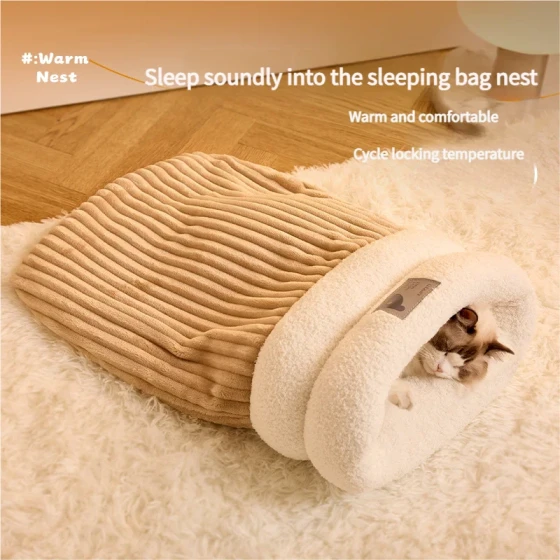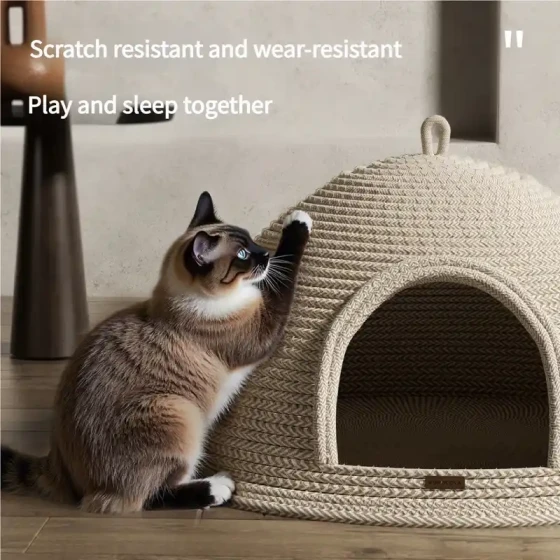What to Do If The Cat Doesn't Sleep At Midnight (What to Do When The Cat Doesn't Sleep at Night)
Cats running wildly, jumping around, knocking things over at night, constantly opening cabinets, and making noises like "bang bang bang"—are you unable to sleep at all? Or maybe your cat wakes up early, crazily scratching at your door or directly sitting on you to force you to get up. As soon as you open your eyes, there’s a pair of large cat eyes staring at you, possibly loudly "meowing meowing meowing." If you chase it out, it scratches the door endlessly, and if it stays in the room, you won’t get any sleep either. As a cat owner, aren’t you very troubled?
What to Do If The Cat Doesn't Sleep At Midnight

Cats are actually crepuscular animals; they are most active at dusk and dawn. Unfortunately, this is usually when the owner is preparing to rest or is in the deepest sleep, while cats are at their most energetic. The poor victim is the owner, who can barely sleep all night. Adult cats behave this way, and kittens and young cats even more so, as they need less sleep, meaning they sleep later at night and get up earlier during the day. Owners raising kittens for the first time will definitely go through this shocking "education!"
Additionally, some cats might be bored during the day with insufficient stimulation, so they spend most of the daytime resting or sleeping. When nighttime comes, because their daytime energy hasn’t been used up, they are not tired at all, allowing them to play even more crazily at night.
Some cats are naturally nervous. The owner might have just moved, rearranged furniture, bought new furniture, or there are new people in the house, such as a baby, a tenant, or visiting family members, causing the cat to feel more anxious and unable to sleep. Sometimes sudden flashing lights or strange noises outside cause the cat not only to lose sleep but also to become agitated, running around and hiding.
Some cats are used to wandering outdoors during the day and only brought indoors to sleep at night. These cats might be unfamiliar with indoor life; they like to stroll outside, watch people and other animals. Being confined at home makes them feel uncomfortable, so they may become agitated and want to go out. Such cats require a longer period of training and adjustment to become purely indoor cats, and owners must be prepared for a long-term effort, so patience is essential.
Furthermore, cats might be hungry in the middle of the night, causing sleeplessness. They make noise by rummaging through things looking for food, and may scratch your door repeatedly to get you to feed them.
During mating season, unneutered cats tend to be more agitated, whether male or female. They start howling as soon as they smell pheromones from other unneutered cats nearby. Male cats will try everything to leave home to find the female cat, and simple screens or mesh doors may not stop a motivated tomcat. These behaviors mostly occur at night, so if your home cats are not neutered, be prepared for disrupted sleep during mating season. Even cats freshly neutered might continue howling for a while.
Also, if a cat does not sleep at night and wakes very early in the morning, it may be ill. Most cats tend to hide and avoid interaction when unwell, showing reduced energy and appetite. However, some cats can exhibit abnormal behaviors like suddenly not wanting to sleep at night and meowing persistently, especially if they are sick, old, or suffering from brain degeneration.
What to Do When The Cat Doesn't Sleep at Night: Solutions
If the cat's schedule synchronizes with yours, you can have a good night's sleep. Train the cat to have a fixed sleep and wake-up time according to the owner’s schedule. Cats that eat two meals a day should have breakfast and dinner at the same times as their owners.
1. When the owner is not home during the day, prepare toys for the cat not just for physical activity but also mental stimulation. Provide toys containing catnip that they can chase and jump after. Also prepare treat-dispensing toys that make cats think and work to get snacks. The most important thing is to let cats experience their hunting instincts. If they aren’t bored during the day and expend more energy, they will be able to sleep at bedtime. One reminder: do not allow cats to play alone with string-like toys such as feather wands, especially without supervision, as many cats like to eat strings, which can cause serious intestinal blockages.
2. After you come home from work in the evening, play more games with your cat before bedtime to expend their physical and mental energy. Games like fetch and feather wands are very suitable. Hide treats around the home or inside toys, encouraging the cat to think and figure out how to get the treats. These activities not only help them sleep better at night but also improve their quality of life positively by satisfying their strong hunting instincts, making their life more colorful and joyful!
3. The cat’s resting and sleeping nest is also very important. They like to rest in places where they feel safe, comfortable, and quiet. Therefore, place their nest away from noisy or strangely lit areas. Avoid positioning the nest in a place that makes them highly anxious. For example, if you regularly feed your cat medicine or trim nails in the dining room, they will dislike the dining room, and placing their nest there will almost certainly fail.
4. Develop a habit of fixed-times and fixed-amount feeding for your cat to avoid them suddenly feeling hungry at night. Adult cats should eat 2-3 meals a day, and kittens 4-6 meals a day. Follow the recommended food amounts for the particular cat food. For cats prone to midnight hunger, feeding a little food before sleep can prevent hunger waking them up.
5. If the cat is old, provide a night light so it can see and not get lost. Avoid frequently changing furniture arrangements to prevent confusion finding the litter box or food bowls.
6. If the cat’s behavior suddenly changes significantly, such as reduced energy, weight loss, changes in appetite or drinking, vomiting, diarrhea, or easy shortness of breath, it might be sick. Sleeplessness and nocturnal crying could be part of these symptoms; take the cat promptly to a veterinarian for examination.
7. If the cat starts howling and trying to escape at night and your cat is not neutered, it means other cats nearby are in heat. Taking your cat to the veterinarian for neutering can reduce nighttime howling and escape attempts.
If you confirm that your cat’s nighttime noise and activity are not due to illness or old age but just wanting attention or food, try to ignore it! While satisfying a cat’s physical and dietary needs is important, do not let them control you. If you pet or give treats whenever the cat meows, it will learn that all desires are fulfilled, fostering demanding behavior. When it meows or seeks attention, wait a few seconds until it stops, then pet it. If it keeps meowing, ignore it or walk away, only petting once it is quiet. Let the cat know the decision power is yours, not theirs.
If the cat meows early in the morning and the owner feeds it immediately, it will develop the habit of eating at that time and get angry without food, meowing louder and scratching doors harder. The cat will become increasingly demanding, possibly starting to wake you even earlier. This creates a vicious cycle where you need to get up earlier and earlier to feed them.
The last and most important point is never to scold or hit your cat. Cats don’t understand why you are angry and won’t know you are trying to make them stop. Instead, they will just become afraid and run away from you. So, find out why your cat doesn’t sleep at night and apply targeted solutions to solve the problem.
Source: Furtune Cat Whisperer





